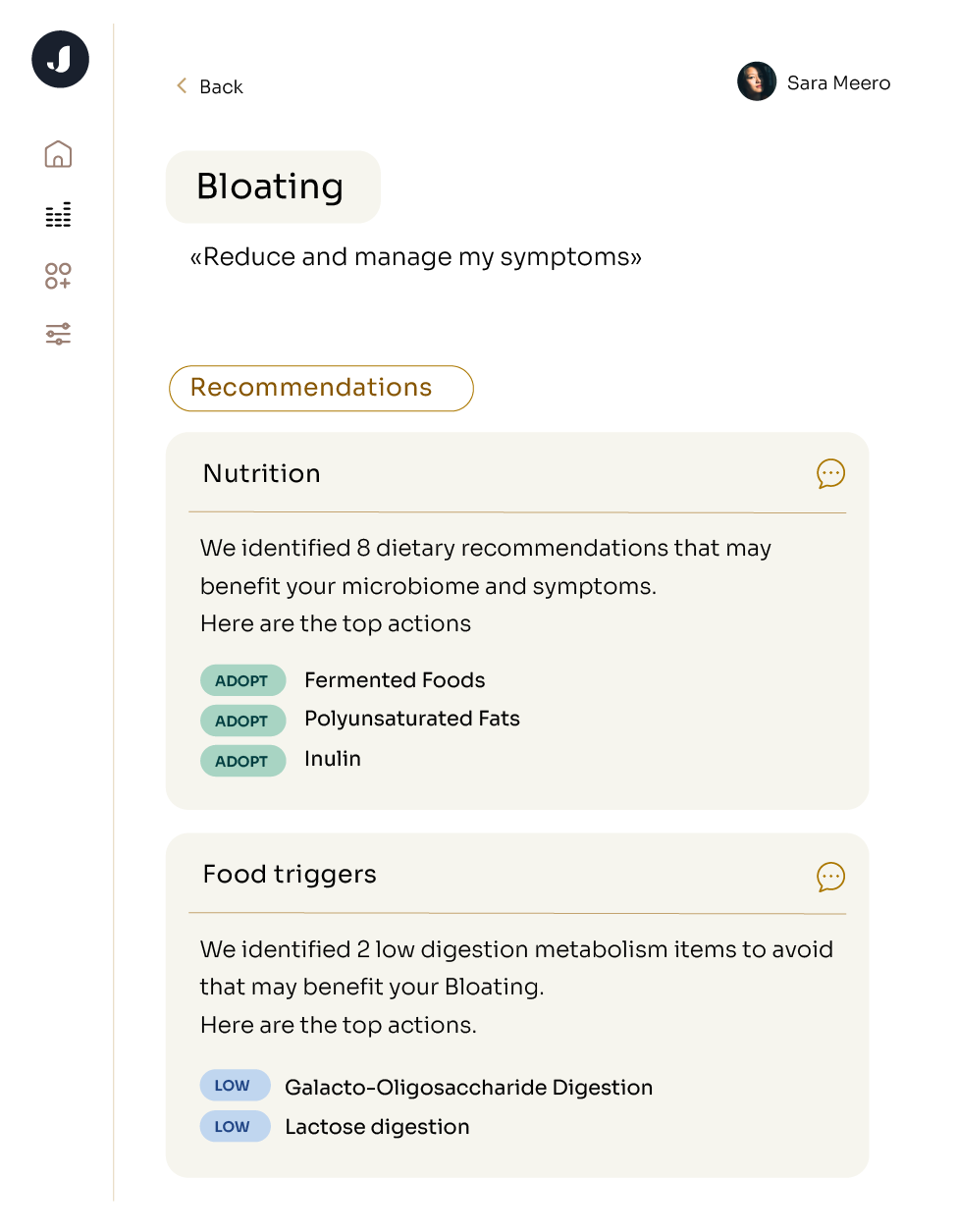Leaky gut, medically referred to as increased intestinal permeability, occurs when the lining of the small intestine becomes damaged. This damage allows substances such as undigested food particles and bacteria to "leak" through the intestinal wall into the bloodstream. This leakage can trigger inflammatory and immune responses, leading to a range of health issues. See our previous blog to learn more about what leaky gut is and how doctors and scientists view it.
Identifying leaky gut syndrome can be challenging due to its non-specific symptoms, which often overlap with other gastrointestinal and systemic conditions. Common symptoms include bloating, food sensitivities, fatigue, digestive disturbances and skin issues. While there is no single definitive test for leaky gut syndrome, your doctor may recommend a lactulose-mannitol test, which measures intestinal permeability or a gut microbiome test. For example, Jona’s microbiome test looks for signature patterns in your microbiome that have been linked with leaky gut. Consulting with a healthcare professional for a thorough evaluation and differential diagnosis is crucial.
Leaky gut can potentially affect anyone and certain factors increase the risk. These factors include chronic stress, poor diet (high in processed foods and sugar), excessive alcohol consumption and the use of nonsteroidal anti-inflammatory drugs (NSAIDs). Additionally, individuals with autoimmune diseases, chronic inflammatory conditions, and those undergoing cancer treatments may be more susceptible.
Gastroenterologists are specialists in digestive health and can provide expert guidance on leaky gut. Functional medicine practitioners and nutritionists with experience in gut health can also offer valuable insights and personalized treatment plans.
Working with a healthcare professional ensures a thorough evaluation and accurate diagnosis. Tests for leaky gut may include:
- Lactulose-Mannitol Test: A urine test that measures intestinal permeability
- Comprehensive Microbiome Analysis: Assesses gut microbiome health, including the bacteria, viruses, and fungi present in your gut. Leaky gut has been associated with several microbiome patterns which can be detected through a microbiome analysis
Zonulin Test: Zonulin is a protein in stool related to increased intestinal permeability. Higher zonulin levels can indicate an impaired intestinal barrier.
Treating increased intestinal permeability depends on the actual source of the problem. For some people, a weakened intestinal barrier is due to inflammatory bowel disease or another diagnosable condition. In those cases, a gastroenterologist may conduct an endoscopy or prescribe immunosuppressants. If you suspect you have leaky gut syndrome, seek guidance from a gastroenterologist.
Holistic steps to support a healthy gut barrier include adopting a diet rich in whole foods, fiber, and anti-inflammatory nutrients while avoiding processed foods, refined sugars and potential irritants.
If you have increased intestinal permeability, you’ll want to prioritize whole foods and stay away from highly processed snacks. Doctors also recommend avoiding alcohol, as it can cause further inflammation in the gut.
The concept of "curing" leaky gut syndrome is complex, as there is no agreed-upon basis for what constitutes a disease state. The goal of treatment is to restore the integrity of the gut barrier.
The gut microbiome plays a crucial role in maintaining intestinal barrier integrity. A balanced and diverse microbiome feeds on the indigestible parts of your food like fiber, allowing the mucus lining of the gut to repopulate itself. The gut microbiome can also support the healing of leaky gut syndrome by producing anti-inflammatory short-chain fatty acids and keeping the immune system from attacking the body’s own cells.
It’s not clear that leaky gut syndrome can be prevented, but you can take some dietary steps to reduce your risk. The science recommends eating a diet low in saturated fats and avoiding artificial sweeteners. Leaky gut syndrome has been especially prevalent in Western countries, where diets high in fat and refined carbohydrates are common. Some carbohydrates also seem to increase risk for increased intestinal permeability, but this link is less clear.
Beyond diet, you can also avoid unnecessary antibiotics, which reduce gut flora quantity and diversity, and pay attention to unidentified gut issues that don’t resolve themselves over time.








